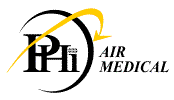Abuse of air medical ambulances — helicopters — goes on every day in this country. Many ambulance services are for-profit businesses. They take a patient when called by paramedics. But the injured party can later get a bill of $15,000 or more. And insurance companies, more than ever, are loathe to pay these bills, especially when they find that the trips were unnecessary. That happened to Dana Strittmatter. Here’s her story.
She was boiling water in her kitchen when it spilled on her leg. After paramedics arrived, they called for a medical helicopter from PHI Air Medical, a for-profit company that operates in Dallas-Fort Worth and elsewhere.
PHI Air Medical flew her to Parkland Memorial Hospital in Dallas. She was treated and released in an hour, according to her husband, Larry. She had second-degree burns.
But at the hospital, a doctor and others were angry that she had been transported by helicopter, Larry Strittmatter said.
One doctor told him that abuse of medical helicopters is a growing problem. The hospital expected her to arrive by ambulance.
“They were shocked when the helicopter pilot radioed in announcing his arrival,” he said.
The final bill was $17,500.
The couple’s insurance company, UniCare, paid $3,500, saying the situation did not warrant a helicopter ride because the injury was not life-threatening, Larry Strittmatter said.
PHI Air Medical sent them a bill for $14,000 with a cheerful “Thank you for allowing us to be of service!”
“A tough pill to swallow,” Larry Strittmatter said.
As I first reported in the Dec. 4, 2009 Dave Lieber Watchdog column in the Fort Worth Star-Telegram, on my suggestion, he complained to the Texas Department of Insurance, but that wasn’t right. The agency doesn’t regulate pricing. Nor does any other part of state government — or the federal government, either.
There are no rules about when a helicopter should be dispatched and which service should get the call. There’s no regional dispatch system, either.
With three competing services — PHI, CareFlite and Air Evac Lifeteam — the region has more medical helicopters than most cities.
Yet abuse of medical helicopters “goes on every day in this country,” said Dr. Bryan Bledsoe, an emergency room physician in Midlothian and a vocal critic of the air ambulance industry.
Recently, Bledsoe said, a patient was brought by helicopter to his emergency room with a sore throat.
“The doctor thought it was an abscess, but it wasn’t,” he said. “We treated the patient and sent her home.”
Without regulation, the only hope for the Strittmatters is that PHI won’t aggressively collect the entire amount.
“Some operators are very aggressive about filing lawsuits and using liens to collect payments,” Bledsoe said.
The air ambulance companies court the paramedics who make the decisions about whether to use a helicopter. Some companies, he said, offer paramedics small gifts such as pizza dinners, baseball caps or coffee mugs.
But some patients are getting wise, Bledsoe said.
“We’re hearing more stories about people refusing helicopter service,” he said.
It’s one more piece of the health insurance puzzle that people should pay attention to, according to the Texas Department of Insurance.
Larry Strittmatter said he doesn’t recall being asked to give consent for the helicopter ride. His wife, he said, “was drugged and could not have answered coherently.”
A spokeswoman for UniCare, the insurance company that would pay only part of the cost, told me: “You’re doing a good story because we see cases like this quite a bit.”
An executive with PHI Air Medical, based in Phoenix, who asked not to be named because he wasn’t authorized to speak publicly, told me: “It’s easy to look at the case after the fact. The reality is the paramedic is on the scene and must make a split-second decision. They’re driven by what’s in the patient’s best interest.”
Here’s the background on this: Dr. Roy Yamada is the North Texas medical director for PHI Air Medical. At the same time, he has served as medical director for several North Texas cities amd also Dallas/Fort Worth Airport.
In 2007, Danny Robbins, then an investigative reporter at my newspaper, the Fort Worth Star-Telegram, reported that many cities where Yamada trained the EMS crews also called PHI Air Medical for emergency transports.
The newspaper also reported that, in 2007, a man was flown by PHI Air Medical to Parkland, even though PHI was not the closest air ambulance.
The PHI Air Medical executive said Yamada had nothing to do with the Strittmatter case and has no relationship with Benbrook.
When I called Yamada, he said: “I’m over here at one of the fire departments now giving an exam. So I won’t be able to talk to you. Call corporate on that.”
The PHI executive told me that the Strittmatters can still seek a negotiated settlement with the company.
“PHI is more than willing to talk directly with the patient,” he told me.
Larry Strittmatter sent a certified letter to the company last month asking for help.
Note: The author of this report, Dave Lieber, is The Watchdog columnist for the Fort Worth Star-Telegram. His new book — Dave Lieber’s Watchdog Nation — won two national book awards for social change in 2009.


